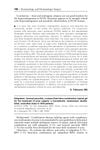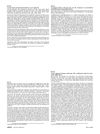 November 2014 in “John Wiley & Sons, Ltd eBooks”
November 2014 in “John Wiley & Sons, Ltd eBooks” Eating high-glycemic and dairy foods can increase hormones that may cause acne and other health issues.
[object Object]  January 2014 in “Journal of the Egyptian Women's Dermatologic Society (Print)”
January 2014 in “Journal of the Egyptian Women's Dermatologic Society (Print)” Women with acne after adolescence are more likely to have PCOS and should be checked for it.
 June 2013 in “Expert Review of Dermatology”
June 2013 in “Expert Review of Dermatology” The article concludes that hormonal therapy is an effective long-term acne treatment, even for those without hormonal imbalances.
Women with acne may have a higher chance of having PCOS, which can lead to other health problems.
 January 2012 in “Yearbook of Dermatology and Dermatologic Surgery”
January 2012 in “Yearbook of Dermatology and Dermatologic Surgery” Taking finasteride daily can effectively and safely increase hair density and thickness for women with hair loss.
 January 2012 in “Yearbook of Dermatology and Dermatologic Surgery”
January 2012 in “Yearbook of Dermatology and Dermatologic Surgery” Studying acne-related syndromes helps us understand acne causes and can lead to new treatments.
 January 2012 in “Yearbook of Dermatology and Dermatologic Surgery”
January 2012 in “Yearbook of Dermatology and Dermatologic Surgery” Low-dose isotretinoin is as effective as conventional doses for acne and has fewer side effects.
January 2012 in “Journal of Islamic International Medical College” Using topical steroids for acne is a bad idea and causes many skin problems.
 January 2011 in “Yearbook of Dermatology and Dermatologic Surgery”
January 2011 in “Yearbook of Dermatology and Dermatologic Surgery” The adapalene-benzoyl peroxide gel works better and faster for acne treatment than using either ingredient alone, with manageable side effects.
 December 2010 in “Zanco Journal of Medical Sciences”
December 2010 in “Zanco Journal of Medical Sciences” Acne is more common and severe in females, often with pre-menstrual flare-ups and associated with seborrhea.
 August 2009 in “International Journal of Dermatology”
August 2009 in “International Journal of Dermatology” A postmenopausal woman's facial redness, acne, and excess hair were caused by too much hormone therapy for insomnia, but improved after stopping the treatment.
 February 2009 in “Journal of The American Academy of Dermatology”
February 2009 in “Journal of The American Academy of Dermatology” Fractional infrared technology is effective and safe for treating cervical laxity.
January 2009 in “Journal of Zhengzhou University” LAIC cream can improve acne by making skin thinner and softer.
CDPDFM can improve acne symptoms in rabbit ears.
February 2006 in “Expert review of dermatology” Acne is caused by hormones, genetics, skin cell buildup, oil production, bacteria, and inflammation.
 July 2002 in “JOGC/Journal of obstetrics and gynaecology Canada”
July 2002 in “JOGC/Journal of obstetrics and gynaecology Canada” Birth control pills help treat acne, especially when caused by excess male hormones, and are safe to use with antibiotics.
September 1998 in “JEADV. Journal of the European Academy of Dermatology and Venereology/Journal of the European Academy of Dermatology and Venereology” Intermittent isotretinoin can cause various skin, hair, and nail changes.
 September 1997 in “Journal of the European Academy of Dermatology and Venereology”
September 1997 in “Journal of the European Academy of Dermatology and Venereology” People with acne have more CD4+ immune cells in their skin than healthy people.

The text is about acne, excessive hair growth, and hair loss due to hormones.
January 1990 in “Journal of dermatological treatment” Clinical features of hyperandrogenism do not predict the success of conventional acne treatment in women.
 July 1989 in “British Journal of Dermatology”
July 1989 in “British Journal of Dermatology” Women's acne improvement with antibiotics is not linked to signs of high male hormones.
[object Object] Cyproterone acetate is an effective treatment for women with acne, hair loss, and excessive hair growth.
November 2022 in “Journal of the Endocrine Society” Correcting vitamin D and progesterone deficiencies can significantly improve hair loss, acne, and BPH symptoms.
September 2022 in “Journal of The American Academy of Dermatology” Dermatologists should monitor potassium levels in women taking spironolactone for acne, hair loss, and hirsutism.
September 2022 in “Journal of The American Academy of Dermatology” Monitoring potassium levels is important for women taking spironolactone.
June 2021 in “Egyptian Journal of Dermatology and Venereology” Psoriasis, acne, and hair loss are linked to unhealthy cholesterol levels, increasing heart disease risk.
 April 2021 in “Journal of Investigative Dermatology”
April 2021 in “Journal of Investigative Dermatology” Transgender patients on hormone therapy experience more acne and hair loss, but less skin inflammation.
December 2020 in “Journal of Skin and Sexually Transmitted Diseases” No strong link between testosterone or DHEAS levels and acne or hair loss in females.
 May 2019 in “Journal of the Dermatology Nurses’ Association”
May 2019 in “Journal of the Dermatology Nurses’ Association” Folliculitis decalvans mainly affects middle-aged African American men and is treated with antibiotics.
 April 2019 in “Journal of the Dermatology Nurses’ Association”
April 2019 in “Journal of the Dermatology Nurses’ Association” A 37-year-old man with hair loss and skin issues was successfully treated with oral antibiotics, highlighting the need for early treatment. Long-term care includes low-dose antibiotics and avoiding caps and wigs.

















